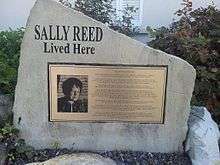Reed v. Reed
| Reed v. Reed | |||||||
|---|---|---|---|---|---|---|---|
|
| |||||||
| Argued October 19, 1971 Decided November 22, 1971 | |||||||
| Full case name | Sally M. Reed, Appellant, v. Cecil R. Reed, Administrator, etc. | ||||||
| Citations | |||||||
| Subsequent history | 93 Idaho 511, 465 P.2d 635, reversed and remanded | ||||||
| Holding | |||||||
| Administrators of estates cannot be named in a way that discriminates between sexes. | |||||||
| Court membership | |||||||
| |||||||
| Case opinions | |||||||
| Majority | Burger, joined by unanimous | ||||||
| Justices Black and Harlan retired from the Court on September 17th and 23rd (Black died September 25th), respectively, and took no part in the consideration or decision of the case. | |||||||
Reed v. Reed, 404 U.S. 71 (1971), was an Equal Protection case in the United States in which the Supreme Court ruled that the administrators of estates cannot be named in a way that discriminates between sexes.
The case
Sally and Cecil Reed, a married couple who had separated, were in conflict over which of them to designate as administrator of the estate of their deceased son. Each filed a petition with the Probate Court of Ada County, Idaho, asking to be named.[1] Idaho Code specified that "males must be preferred to females" in appointing administrators of estates and the court appointed Cecil as administrator of the estate, valued at less than $1000. Sally Reed was represented at the Supreme Court by Idaho lawyer, Allen Derr, who argued that the Fourteenth Amendment forbids discrimination based on gender.[2]
After a series of appeals by both Sally and Cecil Reed, the Supreme Court considered the case and delivered a unanimous decision that held the Idaho Code's preference in favor of males was arbitrary and unconstitutional.[1]
The Supreme Court ruled for the first time in Reed v. Reed that the Equal Protection Clause of the Fourteenth Amendment prohibited differential treatment based on sex.[3]
Because the Idaho Code made a distinction based on sex, the court reasoned that "it thus establishes a classification subject to scrutiny under the Equal Protection Clause" and using the generic standard of scrutiny—ordinary or rational basis review—asked "whether a difference in the sex of competing applicants for letters of administration bears a rational relationship to a state objective."[1]
Chief Justice Burger's opinion said:[1]
To give a mandatory preference to members of either sex over members of the other, merely to accomplish the elimination of hearings on the merits, is to make the very kind of arbitrary legislative choice forbidden by the Equal Protection Clause of the Fourteenth Amendment; and whatever may be said as to the positive values of avoiding intrafamily controversy, the choice in this context may not lawfully be mandated solely on the basis of sex.
Before the Supreme Court decided the case, Idaho amended its statutes to eliminate the mandatory preference for males, effective July 1, 1972.[1]
Ruth Bader Ginsburg, later an Associate Justice of the Supreme Court, wrote the plaintiff's brief, to which she added the names of Pauli Murray and Dorothy Kenyon as co-authors in recognition of her debt to their work.[4]
Those who brought the case had hoped for a broader decision that would have deemed all classifications based on sex "suspect", a category the Supreme Court reserved for race. A suspect classification would be held to a more exacting standard of scrutiny known as strict scrutiny. The ACLU established its Women's Rights Project under Ginsburg to develop cases to persuade the court to treat sex-based distinctions that way.[5]

A plaque serves as a memorial to the case at the site of Sally Reed's former home (now the location of an Idaho Angler store) at the intersection of S. Vista Ave. and W. Dorian St. in Boise, Idaho.[6][7]
See also
References
- 1 2 3 4 5 Reed v. Reed at Cornell Law School
- ↑ Miller, John (June 11, 2013). "Derr's work advanced gender equality - Idaho lawyer who won landmark case dies at 85". Associated Press. Spokesman-Review. Retrieved July 9, 2013.
- ↑ Reed v. Reed - Significance, Notable Trials and Court Cases - 1963 to 1972
- ↑ Linda K. Kerber (August 1, 1993). "Judge Ginsburg's Gift". The Washington Post. – via HighBeam Research (subscription required) . Retrieved January 14, 2013.
- ↑ Stetson, Dorothy McBride (1997). Women's Rights in the U.S.A.: Policy Debates and Gender Roles, 2nd edition. Routledge. p. 34.
- ↑ "Sally Reed - Boise, ID". Civil Rights Memorials. waymarking.com. Retrieved May 22, 2013.
- ↑ "Sally Reed Lived Here". Boise Sesquicentennial. Boise City Department of Arts & History. Retrieved May 22, 2013.
External links
 Works related to Reed v. Reed at Wikisource
Works related to Reed v. Reed at Wikisource
| Wikisource has original text related to this article: |
- Text of Reed v. Reed, 404 U.S. 71 (1971) is available from: Findlaw Justia resource.org OpenJurist
